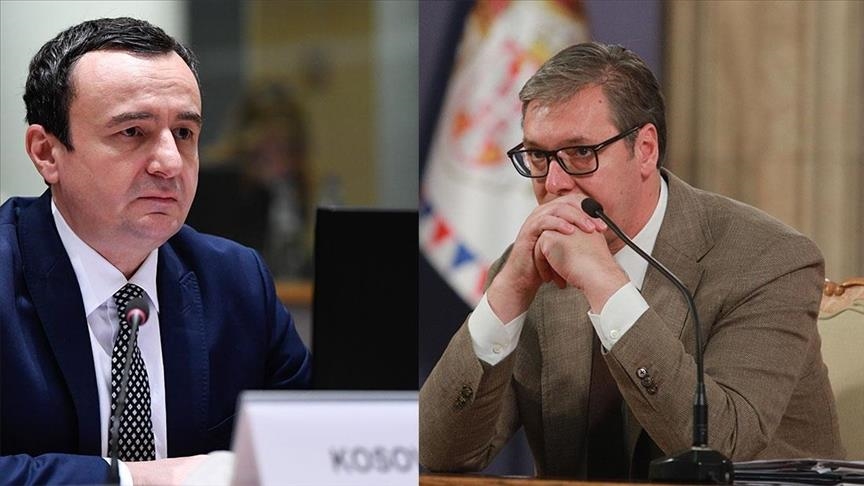Meeting between leaders of Serbia, Kosovo in Brussels unlikely to produce concrete results: Experts
Serbian president, Kosovo’s prime minister to meet with head of NATO, EU foreign policy chief amid border tensions

BELGRADE, Serbia
Experts are doubtful that concrete results will emerge from meetings that Serbia’s president and Kosovo’s prime minister will hold in Brussels this week.
Amid recent border tensions, Aleksandar Vucic and Albin Kurti accepted an invitation from EU foreign policy chief Josep Borrell for a meeting on Aug. 18.
They will meet with Borrell as well as NATO chief Jens Stoltenberg and Miroslav Lajcak, the EU special representative for the Belgrade-Pristina Dialogue and Western Balkans.
Launched in 2011, the EU-led Belgrade-Pristina Dialogue aims to normalize relations between the two Balkan countries and find a mutually agreeable solution to their disputes.
Kosovo declared independence from Serbia in 2008, with most UN members, including the US, UK, France, Germany and Türkiye, recognizing it as a separate autonomous country from its neighbor.
Serbia, however, still claims Kosovo as its territory.
The Brussels talks will take place slightly over a year after they last met in July 2021, one of two meetings last year that failed to produce significant results.
Tensions between Belgrade and Pristina escalated in late July ahead of Kosovo’s planned implementation of a new law making it mandatory for everyone, including Serbs living in Kosovo, to have a Kosovar ID card and license plate.
Later, Kosovo announced that it had decided to delay the new measures until Sept. 1.
Vucic called for dialogue to resolve issues with Kosovo.
Dritero Arifi, a political science professor, told Anadolu Agency that the European Union is not ready for such a serious meeting.
Borrell “is organizing the meeting only to somehow create the impression that peace and negotiations are continuing and that the two countries have a good relationship,” said Arifi.
He said relations between the two countries are not good.
“I do not expect anything from this meeting. If something positive is to happen, there may be acceptance in principle to settle the issue of missing persons of the Kosovo war,” he said.
“If this happens, it will be a great victory for Kosovo. If not, we will continue with the same rhythm, with one or two meetings a year without achieving anything, because the EU and facilitators of this dialogue did not show seriousness,” he added.
He said Kosovo should move ahead with its ID and license plate measure on Sept. 1 to convey its stance on the rule of law.
Serbian political scientist Ognjen Gogic said the US does not want destabilization in the Balkans and will press for some kind of agreement between Kosovo and Serbia in Brussels.
The chaos recently witnessed in the north of Kosovo does not suit the Americans “because it will open the door for the Russians to intervene,” he said.
Gogic said there are people in the north of Kosovo who do not have Kosovar identity cards.
“They have Serbian identity cards. They got married in Kosovo, and it is difficult for them to get Kosovar documents because their marriage certificates are not mutually recognized,” he explained.
Gogic said the does not expect a final agreement on Kosovo-Serbia normalization anytime soon.
Dusan Janjic, chairman of the board of the Serbia-based Ethnic Relations Forum, said Vucic’s meeting with NATO chief Stoltenberg holds more importance because it could determine the course of his talks with Kurti.
“The topic of security is now on the agenda. It is an opportunity for both Belgrade and Pristina. For Belgrade, it is an opportunity to raise the issue of a security package that currently does not exist,” said Janjic.
He added that a joint cooperation mechanism of Kosovo, Serbia and NATO should be proposed to fight organized crime and terrorism, as well as general security in the region.
This is also a chance for Belgrade to show that it is “out of pro-Russian politics,” he said.
About the situation in Kosovo, Janjic said Serbs will not follow Vucic’s policy if it leads to escalation.
He said the third actor, Russia, wants further escalation in Kosovo because “a small war in the Balkans would show the EU’s irresponsibility toward Ukraine.”






